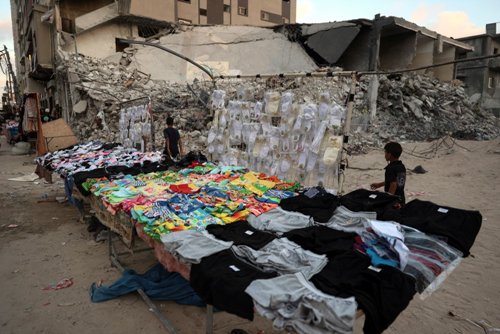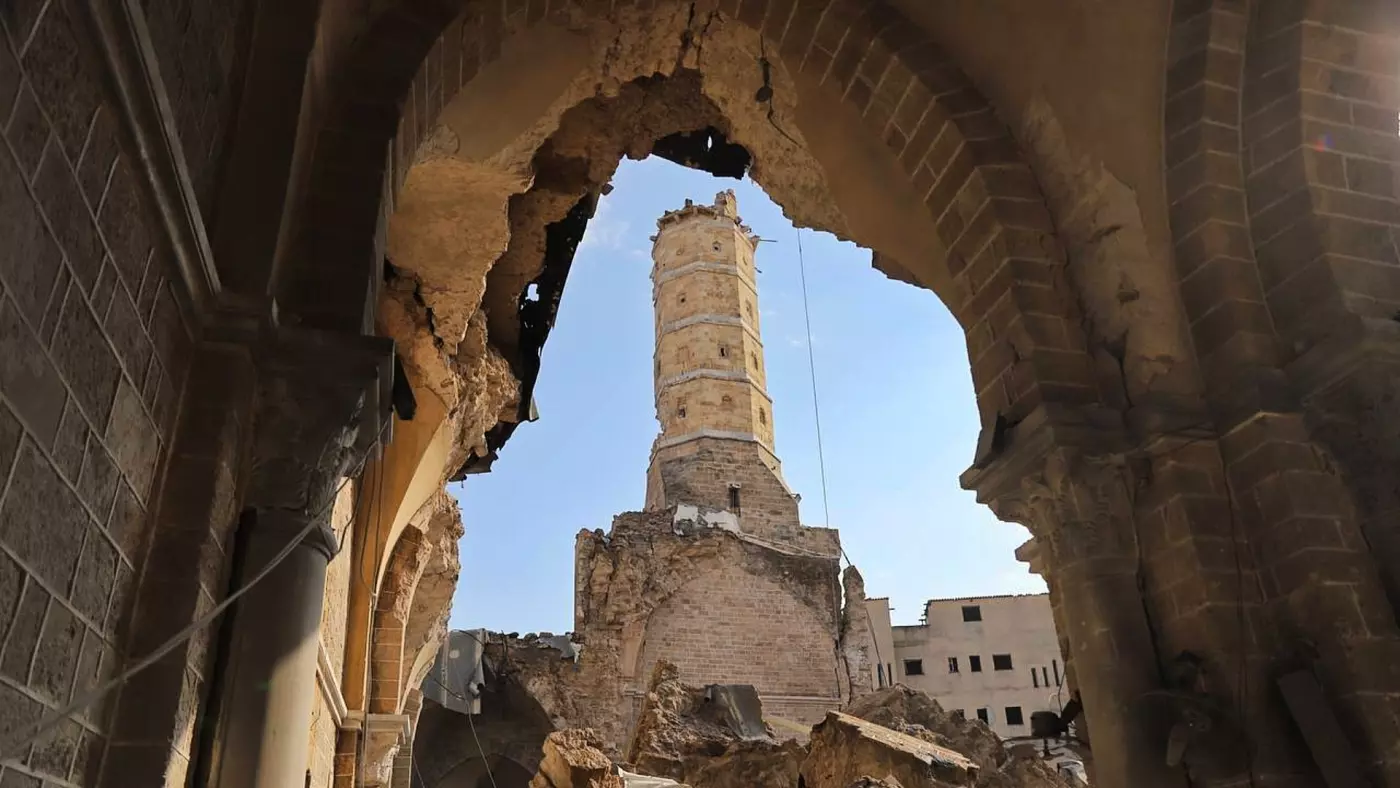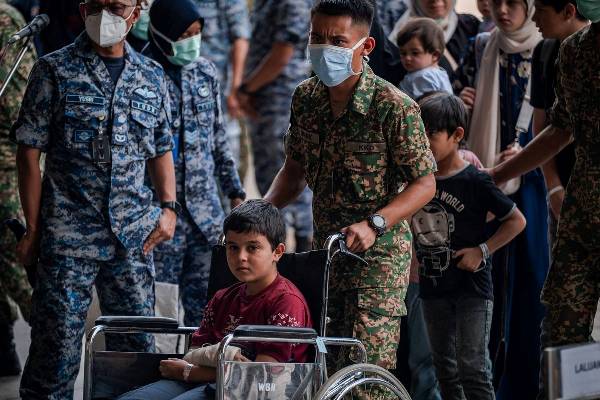Two months after Israel and Hamas reached a ceasefire marking the end of an 11-day conflict that killed 248 Palestinians in the Gaza Strip and 13 people in Israel, life has remained at a standstill for many in the blockaded Palestinian enclave.
The two million Palestinians living in Gaza continue to face tight Israeli restrictions on the entry of goods into the small territory, causing a major economic recession while making reconstruction impossible.
While Egypt’s mediation has succeeded in putting an end to the killing and destruction, Cairo’s efforts have yet to succeed in bringing the situation in Gaza back to pre-war levels – a status quo which was already precarious and strained for its residents, already living for 14 years under an Israeli-led siege.
Amid Israel’s insistence on linking the issue of imports and reconstruction to the release of four Israelis believed to be held by Hamas, analysts are split on whether the ongoing paralysis in Gaza could spark further confrontation down the line.
Reconstruction efforts on hold
Officials in Gaza have warned that strict Israeli restrictions have had negative effects on all aspects of life in the besieged Palestinian territory, leading to an unprecedented rise in poverty and unemployment rates.
“Israel doesn’t allow in more than 30 percent of the amount of goods and commodities that were entering Gaza before the outbreak of the war, which has caused a crazy rise in prices,” Rami Abu al-Rish, the director general of trade and crossings for the Ministry of the Economy in Gaza, told Middle East Eye.
Israel has prevented the import of raw materials, building materials, electrical appliances and equipment, as well as wood, metal and plastic equipment into Gaza, while imposing strict restrictions on exports, allowing only small quantities of produce and fish to come out of the Palestinian territory.
Abu al-Rish added that the restriction had led to a state of “paralysis” in various industrial, commercial and agricultural sectors in Gaza, leading in turn to negative consequences on the broader population, with unemployment rising to 75 percent.
According to the Ministry of the Economy in Gaza, thousands of workers have lost their livelihoods in recent months, whether due to the destruction of commercial and industrial facilities or the suspension of production due to the blockade and restrictions, in addition to the impact of maritime restrictions on the lives of thousands dependent on fishing for work.
With goods they ordered stuck on the Israeli side of the crossings, Palestinian businesses have suffered. Adel Hussein, the director of a company working in solar energy, told MEE: “There are large shipments of goods for our company and other companies that are not allowed to enter, despite the suffering of the Gaza Strip due to power outages and the need for solar energy systems.”
According to estimates by Gaza’s Higher Governmental Committee for Reconstruction, losses and damages due to the 11-day war amount to some $479m. However, Hussein argues that the long-term cost of the conflict is hard to quantify.
“The direct losses as a result of the war have become clear, but there are losses as a result of the closure, and no one talks about that, it’s not discussed,” he said. “There is a major economic recession as a result of the lack of many goods and of citizens’ weak purchasing power.”
Meanwhile, Israel has been preventing the entry of Qatari aid, amounting to some $30m per month since the 2018 Great March of Return – barring Mohammed al-Emadi, an official for the Qatari Committee for Reconstruction, from bringing in the money in a suitcase through the Erez crossing.
Israel has argued that mechanisms for aid to enter Gaza need to be changed to ensure that it does not reach Hamas – changes which have been rejected thus far by the Palestinian group, which has served as the de facto ruling party in the Gaza Strip since an armed conflict with political rival Fatah in 2007.
The Gaza City municipality, which is the largest in the Gaza Strip, has been hit especially hard by the restrictions on imports. According to the Ministry of Public Works and Housing in Gaza, some 1,800 housing units were destroyed, while about 16,800 housing units were partially damaged. Among the buildings destroyed were five towers, 74 public and government facilities, 66 schools and three mosques.
Municipal council member Hisham Skaik told MEE that 13 ongoing infrastructure projects were halted after the outbreak of the war.
“The tightening of restrictions at Kerem Shalom, the only commercial crossing into Gaza, has also caused the failure to start about 16 infrastructure projects, which had been funded two years ago and whose contracts had been signed,” Skaik said.
Furthermore, he added that the municipality had yet to receive much international aid to address the damage caused to infrastructure by Israeli air strikes in May, estimated to cost $20m.
For al-Rish, “the horizon is blocked”. With the situation in Gaza getting worse day by day, the Palestinian business owner sees no indication of a breakthrough soon.
Pressure for prisoner release
Through its tight restrictions on imports, Israel is believed to be deliberately pressuring Hamas in order to obtain the release of four Israelis, two of whom are dead, believed to be held by the Palestinian movement in Gaza.
The bodies of Israeli soldiers Oron Shaul and Hadar Goldin have been reportedly held by Hamas since the 2014 war. Two Israeli civilians, Avera Mengistu and Hisham al-Sayed, wandered into Gaza in 2014 and 2015 respectively, and are believed to be held captive by Hamas.
Hamas has insisted that the release be done within the framework of a prisoner exchange deal similar to the 2011 Shalit deal, in which one Israeli soldier, Gilad Shalit, was swapped in exchange for 1,027 Palestinians imprisoned by Israel.
While Egypt has been leading mediation efforts, Palestinian officials have said that no tangible progress has been made so far.
In response, Hamas and its allied factions in Gaza have sought in recent days to exert pressure on Israel through the partial revival of so-called “night confusion” activities, which were carried out during the Great March of Return along the separation fence between Gaza and Israel – from burning tyres at night to launching incendiary and explosive balloons towards Israeli land beyond Gaza.
According to Israeli media reports, military and security officials in the country are wary of a renewed confrontation with Hamas should the deadlock persist on the entry of Qatari aid in Gaza and on prisoner deal talks, and if the continued economic and humanitarian difficulties in the enclave are not relieved – nor the persistent tensions in occupied East Jerusalem, including over al-Aqsa mosque.
Hamas spokesman Abdul-Latif al-Qanu has warned that “more restrictions on Gaza will only generate an explosion in the face of the occupation”.
But Palestinian political analyst Hassan Abdo rules out a resumption of large-scale military confrontation with Israel in the near term.
“The reality on the ground in Gaza after the last war does not qualify for a new round of armed confrontation, while on the other hand the new Israeli government headed by Naftali Bennett is a ‘fragile’ government that fears any confrontation with Gaza will lead to its collapse.”
Nonetheless, Abdo did not rule out the prospect that continued Israeli restrictions on Gaza would lead to a re-emergence of “activities of the Great March of Return, and the emergence of new forms of resistance to the occupation”.
Post Disclaimer | Support Us
Support Us
The sailanmuslim.com web site entirely supported by individual donors and well wishers. If you regularly visit this site and wish to show your appreciation, or if you wish to see further development of sailanmuslim.com, please donate us
IMPORTANT : All content hosted on sailanmuslim.com is solely for non-commercial purposes and with the permission of original copyright holders. Any other use of the hosted content, such as for financial gain, requires express approval from the copyright owners.
 Sri lanka Muslims Web Portal Sri Lanka Muslims News Center
Sri lanka Muslims Web Portal Sri Lanka Muslims News Center

 Donate
Donate


